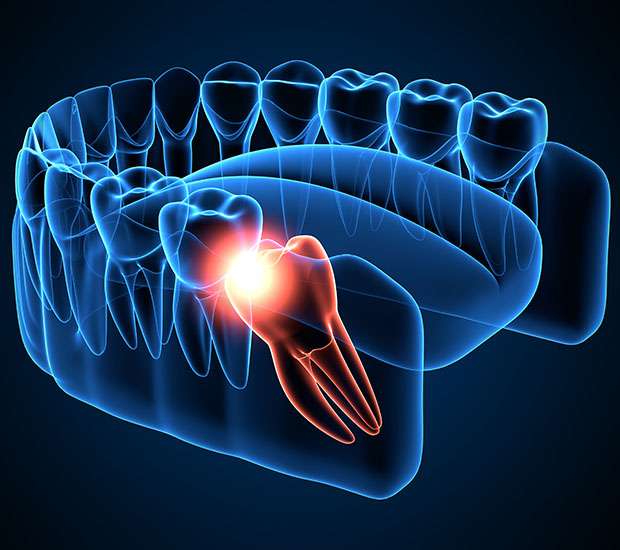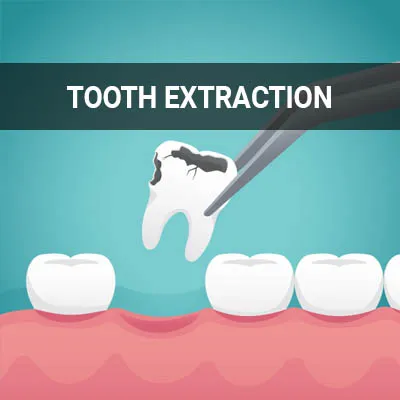Wisdom Teeth Extraction Houston, TX
Wisdom teeth extraction can help to relieve pain in a patient's teeth that results from the wisdom teeth causing crowding issues or growing incorrectly. There are many different reasons you may need to extract your wisdom teeth. Wisdom teeth extraction removes the third set of molars in the back of your mouth.
Wisdom teeth extraction is available at Dental Bright in Houston and the surrounding area. Most patients who need wisdom teeth extraction are in the stages of young adulthood. Call us today at (713) 357-6355 to learn more and schedule an appointment.
Understanding Wisdom Teeth Extraction
"Wisdom teeth" is the colloquial term for the third set of molars that sit in the back of the mouth. They are called such because they come between the more "mature" ages of 17 and 21. The emergence of wisdom teeth can be uncomfortable, even if they are emerging correctly. Wisdom teeth do not always necessitate extraction. On the contrary, properly aligned wisdom teeth may assist in chewing.
However, if there is no adequate space for the wisdom teeth to emerge or if the teeth are coming through in the wrong position, they may become impacted (or trapped in the jaw or under the gums). This may cause cysts, damage to neighboring teeth, gum disease, infection, pain, tooth, decay, and tumors. A dentist needs to monitor the patient's wisdom teeth and determine the best course of action.
“”Wisdom teeth” is the colloquial term for the third set of molars that sit in the back of the mouth.”
What to Know Before Wisdom Teeth Extraction
Wisdom teeth extraction is commonly performed and generally safe when carried out by qualified doctors. However, like any other surgery, it does carry a small risk of complications. These include bleeding, dry socket, and infection. Our team will do everything we can to minimize these risks even further. However, patients should contact our office immediately if they find themselves experiencing any of the following symptoms after their extraction:
- Absent or dislodged blood clot at the extraction site after surgery
- High temperature
- Yellow or white discharge from the extraction site
- Persistent pain and swelling
- Persistent, heavy bleeding that does not subside over time
- Throbbing pain in the gum or jaw
- Unpleasant smell or taste in the mouth
Most potential complications following wisdom teeth extraction are easily treatable when reported to the doctor.
“Wisdom teeth extraction is commonly performed and generally safe when carried out by qualified doctors.”
Preparing for Wisdom Teeth Extraction
The first step to wisdom teeth extraction begins with an initial consultation. During this time, patients should be open and honest with their doctor about their entire medical history. This includes but is not limited to sharing any health problems they may have, any medications and supplements they may take regularly, and any lifestyle choices that may influence the success of the surgery. The consultation is also a good time for patients to assuage their anxieties by asking any questions about the procedure.
“The first step to wisdom teeth extraction begins with an initial consultation.”
Check out what others are saying about our dental services on Yelp: Wisdom Teeth Extraction in Houston, TX
What to Expect During Wisdom Teeth Extraction
Generally, wisdom teeth extraction begins with the doctor injecting the patient with a local anesthetic to numb them to the pain of the procedure. The doctor will then cut into the gum tissue to expose the tooth and bone, making sure to remove any bone blocking access to the tooth root. Depending on how severely impacted the tooth is, the tooth may be divided into sections to be removed little by little.
After extracting the tooth, the doctor will clean the extraction site of any debris. Afterward, the wound may or may not need stitches, and the doctor will pack gauze over the extraction site to control bleeding and to aid in the formation of a blood clot.
“After extracting the tooth, the doctor will clean the extraction site of any debris.”
Questions Answered on This Page
Q. What are the potential risks of wisdom teeth extraction?
Q. How do I begin preparing for wisdom teeth extraction?
People Also Ask
Q. What happens during a tooth extraction procedure?
Q. What other preventative services are available?
Q. How can someone find out what procedures their dental insurance covers?
Aftercare for Wisdom Teeth Extraction
Patients should expect to rest for the remainder of the day following their wisdom teeth extraction. Though regular activities can be resumed as soon as the day after, patients should refrain from any strenuous activity for at least a week following their procedure. Otherwise, they run the risk of overexertion and dislodging the blood clot. Our team will provide patients with a customized recovery plan for their specific procedures.
Complications following wisdom teeth extraction are rare as long as patients follow this plan. However, patients should contact us immediately if they are experiencing any of the following:
- Blood or pus in nasal discharge
- Difficulty swallowing or breathing
- Excessive bleeding
- Fever
- Foul taste in the mouth
- Persistent numbness or loss of feeling
- Pus in or oozing from the socket
- Severe pain that does not subside
- Swelling that does not subside after two or three days
“Though regular activities can be resumed as soon as the day after, patients should refrain from any strenuous activity for at least a week following their procedure.”
Frequently Asked Questions
Q. Will I be able to drive myself home after wisdom teeth extraction?
A. This varies from person to person and the type of anesthesia used. Some patients who were only under a local anesthetic may feel alert enough to drive back home after their procedure, while some may not. However, those who have undergone general anesthesia will need to make arrangements for someone to drive them to and from the operation.
Q. Will I be in pain after wisdom teeth extraction?
A. You should expect some pain and discomfort following the procedure. However, this is generally manageable through administering ice packs and taking over-the-counter pain relievers. The dentist may prescribe you antibiotics, depending on the severity of your procedure.
Q. What can I eat after wisdom teeth extraction?
A. You may not have much of an appetite after getting your wisdom teeth extracted. Still, it is essential to stay hydrated and eat well. Since you do not want to dislodge your blood clot or stitches, stick to soft, low- or no-chew foods for the first few days. Refrain from eating anything hot or hard. Do not drink from a straw or slurp too vigorously from a spoon.
Q. How old do I need to be to have my wisdom teeth extracted?
A. Wisdom teeth can be extracted at any age, depending on the severity and type of impaction. However, complications are less likely in younger adults.
Q. Is there anything I should avoid while recovering from my wisdom teeth extraction?
A. You should exercise caution to avoid dislodging your blood clot or stitches for the first week. This means avoiding smoking, spitting, drinking from a straw, or anything else that might disrupt your healing.
Dental Terminology
Helpful Related Links
- American Dental Association (ADA). Glossary of Dental Clinical Terms. 2024
- American Academy of Cosmetic Dentistry (AACD). Home Page. 2024
- WebMD. WebMD’s Oral Care Guide. 2024
About our business, license, and website security
- Dental Bright was established in 2007.
- We accept the following payment methods: American Express, Cash, Discover, MasterCard, and Visa
- We serve patients from the following counties: Harris County
- We serve patients from the following cities: Houston, Sugarland, Missouri City, and City of Bellaire
- TX (License #18923). View License Information and Specifics
- National Provider Identifier Database (1194942888). View NPI Registry Information
- Norton Safe Web. View Details
- Trend Micro Site Safety Center. View Details
Back to top of Wisdom Teeth Extraction











